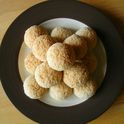What is the healthiest type of sweetener to use, particularly in baked goods?
8 Comments
skittleOctober 5, 2011
I just read an article about exchanging sugars for substitutes in baking. Because of the chemical reaction, you will run the risk of altering the taste of whatever it is you choose to make. It was suggested that any sub you make, you do no more than a 20% swap of substitute and keep sugar for the other 80. I know this doesn't answer your question, but thought it might be of help.
susan G.October 5, 2011
I'm a fan of xylitol. Refined, yes, but a sugar that the body actually produces. It improves dental health by suppressing the harmful bacteria in the mouth. Some diabetics, sometimes, can use it. That said, it will not feed yeast, so can't be used alone in yeast recipes; I don't know about the browning properties. But it's easy to use -- 1:1 sub for white sugar, and has no taste issue.
About stevia, there are some brands that have less 'taste' than others, but if you use it, you have to adjust for the liquifying volume of the sugar. There are tested recipes for it. If there are spices in the recipe, that helps make it seem right too, but it is so extremely concentrated that you have to be careful not to use too much.
About stevia, there are some brands that have less 'taste' than others, but if you use it, you have to adjust for the liquifying volume of the sugar. There are tested recipes for it. If there are spices in the recipe, that helps make it seem right too, but it is so extremely concentrated that you have to be careful not to use too much.
JessicaBakesOctober 5, 2011
One thing I did forget to mention...sugar plays a very important part in baking, something boulangere mentions a bit above. Sugar is a huge catalyst for yeast, so never sub out sugar when making a yeast bread. It also helps tenderize baked goods, holds water to keep things moist and contributes to volume of the baked good (generally helps it get to the right volume rather than a dense log of brownie, for example). If you do want to sub out sugar, I don't recommend subbing out more than half...and even that's a lot.
To be honest, I used to be really big on trying to make baked goods "better" for me...now I just focus on making them absolutely spectacular and eating smaller portions. It's more satisfying and they'll actually bake properly. Just my two cents!
To be honest, I used to be really big on trying to make baked goods "better" for me...now I just focus on making them absolutely spectacular and eating smaller portions. It's more satisfying and they'll actually bake properly. Just my two cents!
boulangereOctober 5, 2011
The issue with non-sugar sweeteners in baked goods is one of eye-appeal. Sugar caramelizes in the oven, non-sugars do not. Honey and molasses caramelize beautifully. Honey is twice as sweet as sucrose, table sugar, so you can sub it at half as much sugar as a recipe calls for. It is also, by nature of being an invert (liquid) sugar, somewhat acidic, as is molasses. For every 8 ounces of honey or molasses you substitute, also sift into your dry ingredients 1/2 teaspoon of baking soda to neutralize (create CO2) the acid.
beyondceleryOctober 4, 2011
Stevia is a good option--just be aware that it has a particular flavor that is difficult to disguise. It definitely alters the flavor of baked goods.
JessicaBakesOctober 4, 2011
I'm a big fan of stevia. It's natural and has no calories
beyondceleryOctober 4, 2011
I think that kind of depends on your definition of "healthy." Least processed? Fewest calories? I usually go for maple syrup or honey, since they're more naturally obtained than highly refined cane sugars or artificial substitutes. Real fruit juice (without added sugars) is also a good alternative. You can use this in place of water in a recipe.
I'm not certain of the calories in the various sweeteners. Everything in moderation is a healthy outlook.
Here's an interesting site I came across:
http://www.livrite.com/sweeten.htm
I'm not certain of the calories in the various sweeteners. Everything in moderation is a healthy outlook.
Here's an interesting site I came across:
http://www.livrite.com/sweeten.htm
Showing 8 out of 8 Comments
Recommended by Food52
Popular on Food52
Continue After Advertisement




